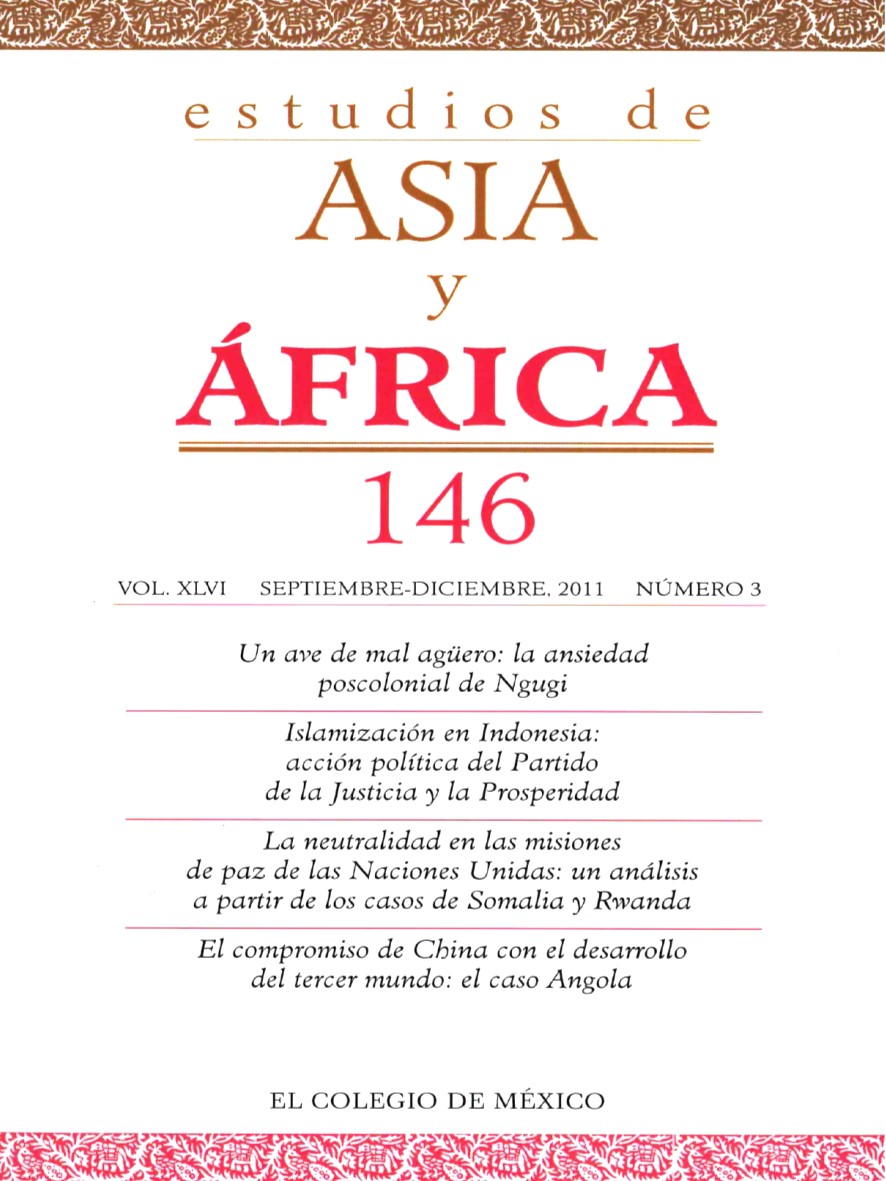Abstract
United Nations peacekeeping missions are one of the Organization responses in order to fulfill its purpose of ensuring peace and security. As a rule, they should be deployed with the consent of the host state, not engage in combat except for self-defense, and maintain strict neutrality with regard to the conflicting parties, thus preventing the United Nations to become part of war, preserve State sovereignty and escape from the charge of implementing a “multilateral colonialism”. In this article about the cases of Rwanda and Somalia, we analyze how the lack of pragmatic management of neutrality in peacekeeping missions may undermine the success of the mission and worse, may lead to escalation of conflict, worsen the fate of civilians and humanitarian calamities in its worst.
References
Adelman, Howard y Astri Suhrke (comps.), The Rwanda Crisis from Uganda to Zaire. The Path of a Genocide, Transaction, 2000.
Africa Watch Physicians for Human Rights, “Somalia. No mercy in Mogadishu. The Human Cost of the Conflict & the Struggle for Relief”, 26 de marzo de 1992.
Bobbio, Norberto, Nicola Matteucci y Gianfranco Pasquino, Diccio¬nario de política, México, Siglo XXI, 2002.
Clarke, Walter S. y Jeffrey Herbst, Learning from Somalia: the lessons of armed humanitarian intervention, Westview Press, 1997.
Dallaire, Romeo, Shake Hands with the devil. The failure of humanity in Rwanda, Nueva York, Carroll and Graf, 2005.
Des Forges, Alison, Leave None to Tell the Story, Human Rights Arms Project, 1999.
Doyle, Michael y Nicholas Sambanis, Making war and building peace, Nueva Jersey, Princeton University Press, 2006.
Holzgrefe, J. L. y R. Keohane, The Humanitarian Intervention. Ethical, legal and political dilemmas, Nueva York, Cambridge Uni-versity Press, 2003.
Huband, Mark, África después de la Guerra Fría. La promesa rota de un continente, Barcelona, Paidós, 2004.
Human Rights Watch, Beyond the Rhetoric - Continuing Human Rights Abuses in Rwanda, vol. 5, núm. 7, junio de 1993.
____________, World Report 1992.
____________, Report Somalia 1993.
____________, World Report 1994.
____________, “Rearming With Impunity: International Support for the Perpetrators of the Rwandan Genocide”, 1 May A704, 1995. [www.unhcr.org/refworld/docid/3ae6a7d0c.html, consultado el 26 enero de 2010.]
Human Rights Watch Africa, “Genocide in Rwanda”, abril-mayo de 1994.
Human Rights Watch Arms Project, “Arming Rwanda. The Trade and Human Rights Abuses in the Rwandan war”, vol. 6, núm. 1, enero, 1994.
LeBor, Adam, Complicity with evil. The United Nations in the age of modern genocide, Londres, Yale University Press, 2006.
Lemarchand, René, The dynamics of violence in central Africa, Uni¬versity of Pennsylvania Press, 2008.
Lewis, I. M., A Modern History of the Somali: Nation and State in the Horn of Africa, Eastern African Studies, Oxford-Athens, Ohio University Press/James Currey (EAS), 2002.
Lortan, Fiona, “Rebuilding the Somali state”, African Security Re¬view, vol. 9, núms. 5-6, 2000.
Luling, Virginia, “Come back Somalia? Questioning a collapsed state”, Third World Quarterly, vol. 18, núm. 2, junio de 1997.
Mamdani, Mahmood, When victims become killers: colonialism, nativism, and the genocide in Rwanda, Princeton University Press, 2002.
Murphy, Ray, Peacekeeping in Lebanon, Somalia and Kosovo, Nueva York-Cambridge, Cambridge University Press, 2002.
Patman, Robert, “Disarming Somalia: the contrasting fortunes of United States and Australians Peacekeepers During United Nations Interventions, 1992-1993”, African Affairs, vol. 96, núm. 385, octubre de 2003.
Perazzo, Silvia, “Reforma de las Naciones Unidas: redimensionar el sistema de seguridad colectiva”, Ágora Internacional, núm. 1, 2006.
Prunier, Gerard, The Rwanda Crisis: history of a Genocide, Nueva York, Columbia University Press, 1997.
____________, Somalia. Civil War, Intervention and Withdrawal 1990-1995.
Thakur, Ramesh, “From peacekeeping to peace enforcement: the UN operation in Somalia”, The Journal of Modern Africans Studies (Cambridge University Press), vol. 32, núm. 3, septiembre de 1994.
Thompson, Allan (ed.), The Media And The Rwanda Genocide, Lon¬dres, Pluto Press-Fountain-IDRC, 2007.
White, Nigel, “UN Peacekeeping: Development or Destruction”, International Relations, año 12, núm. 129, 1994.
This work is licensed under a Creative Commons Attribution-NonCommercial-NoDerivatives 4.0 International License
Copyright 2022 Estudios de Asia y África


